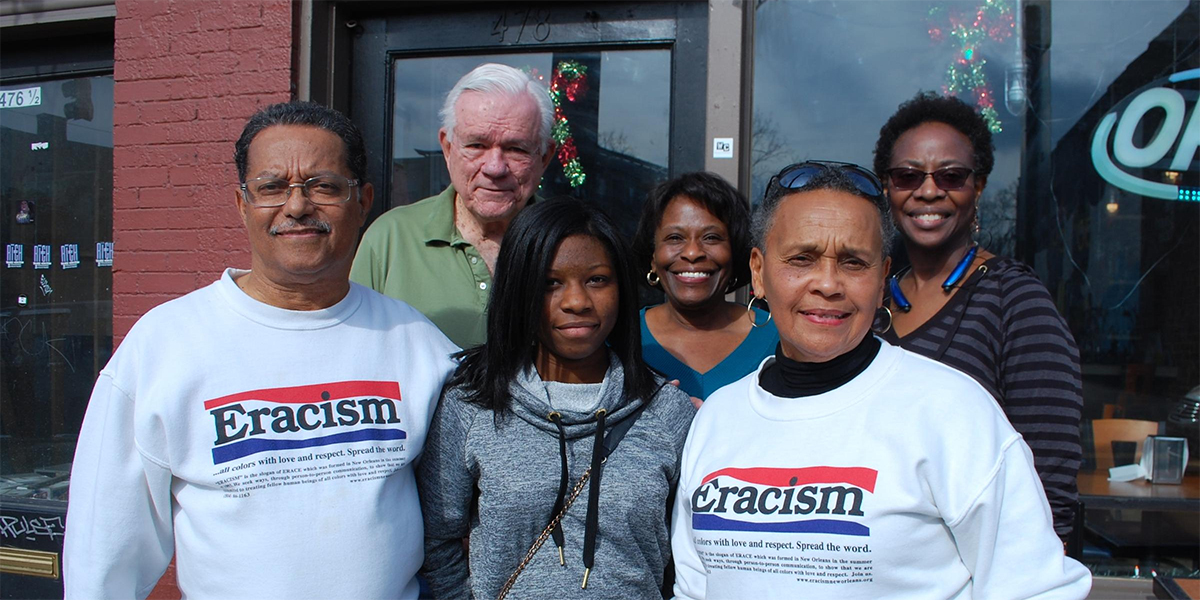Atlanta Group Confronts Racial Stereotypes With Talk

ERACE, founded in Atlanta by Larry and Beatrice Soublet (seen here wearing sweatshirts with the group’s logo, ”Eracism”), has held discussions on race for nearly 10 years.
STEPHANNIE STOKES / WABE
When there’s a high profile event touching on the issue of race, guests on nightly news shows often call for a public conversation about racism in the U.S.
In response, Beatrice and Larry Soublet, founders of ERACE in Atlanta, always say the same thing.
“We are having one,” Beatrice said. “Come to our meeting.”
The Soublets’ group ERACE have been holding community dialogues every other week on race for nearly 10 years now. They’re modeled after discussions started by an organization with the same name in New Orleans, where the Soublets are from.
At one meeting at Our Lady of Lourdes church in the Old Fourth Ward, a dozen or so people gathered around a small table. The members, who are pretty evenly split, black and white, started by introducing themselves. Then, the discussion, centered around a recent editorial or news article, began.
A black man who spoke up talked about how his son was once sent to pick up a white friend from the airport. The friend initially freaked out because he thought the son was attacking him.
A white woman also shared a story about her son whose usually open-minded outlook was shaken when he was attacked by three African-American strangers.
This is what the group is, Beatrice said: an opportunity for people to express their opinions and personal encounters with racism.
“The discussions are civil but sometimes heated,” said Beatrice. “You know, racism is a difficult topic no matter wherever you come from on it, in terms of your experience or your point of view.”
But the idea is, if you can get people of different backgrounds to sit down and explore those feelings, you can start to build empathy across racial lines, Larry Soublet said.
“We’re trying to help people understand what things lead people to do racist-type actions,” Larry said. “And we try to counter stereotypes that people have about white people or about black people.”
They’re stereotypes we may not be fully aware of, as a long-time white attendee, John Francis, learned when he heard a young black man complain about getting groceries in the evening.
“And so, I asked him, ‘What’s the big deal?’ He said, ‘if a black man pulls into the parking lot. If there are any white women around, they’re terrified,’” Francis said, remembering the young man’s story. “’So if you’re not looking for trouble, you sit in your car until you look all around the parking lot and make sure that there are no white women.’”
Listening to that experience, Francis said, gave him some insight.
A newer member, Deborah Lewis, who is black, said she has found the white people’s perspective eye opening.
“Since I’m not in that world, it’s like a way to peek inside somebody else’s world and see this is how, this group of people, this is how they think,” Lewis said.
Lewis believes it’s made her less likely to jump to conclusions about other white people she meets.
This, ideally, is the practical component of ERACE’s discussions – that more interracial understanding can make a difference outside the meetings and out in the world, Beatrice said.
“It is always my hope that the action that people take after leaving is that they are more aware of situations where racism, whether systemic or where somebody is being demeaned, whatever group, that they are a person who kind of has people step back and [say] ‘let’s take a look at this,’” Beatrice said.
The Soublets did concede that ERACE’s members are a self-selected bunch. Most people don’t really enjoy talking about racism.
And that might be why, the group has only ever had 10 or 12 members, which has frustrated Beatrice and Larry at times, but not deterred them. After all, they’ve been at this a decade.





